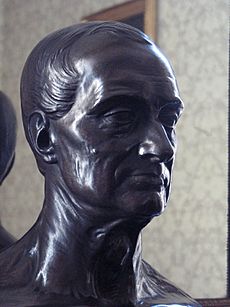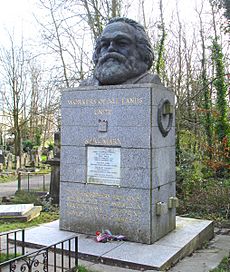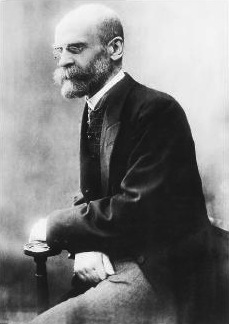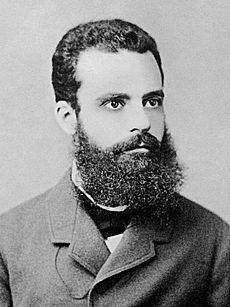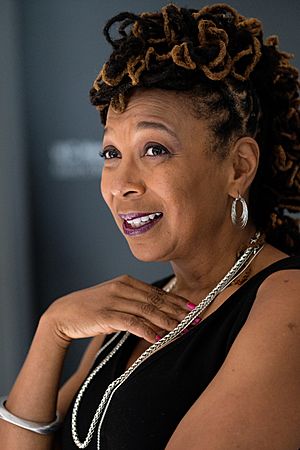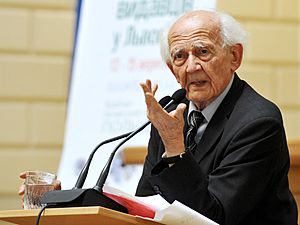History of sociology facts for kids
Sociology is a special way of studying how people live together in groups and societies. It looks at how our actions, beliefs, and even our feelings are shaped by the world around us. This field of study started to become a real science after the French Revolution, around the late 1700s. It grew out of new ways of thinking during the Age of Enlightenment, trying to understand big changes like capitalism (a way of organizing money and business), cities growing bigger (urbanization), and new ways of thinking about the world (modernity).
In the beginning, in the late 1800s, sociologists were very interested in how modern countries (nation states) were forming. They looked at how different parts of society, like schools or governments, helped people learn how to fit in. Sociology helps us understand why societies change, how people interact, and what makes groups of people work the way they do.
Contents
- Early Ideas About Society
- 18th Century: Sociology Begins in Europe
- 19th Century: Defining Sociology
- 19th Century: Sociology Becomes an Academic Subject
- 19th Century: From Positivism to Anti-Positivism
- 20th Century: New Ideas and Global Connections
- 21st Century Sociology
- See also
Early Ideas About Society
Thinking Sociologically Before the Word Existed
Even though the word "sociology" didn't exist until later, people have been thinking about how societies work for a very long time. We can call these early ideas "proto-sociology." These thinkers developed strong ways of looking at society that are similar to what sociologists do today.
Ancient Greek Thinkers
Ideas that sound like sociology can be found as far back as the ancient Greeks. They often thought about social issues because their cities were not very big or centrally organized. Important thinkers like Plato and Herodotus wrote about how people lived and interacted in their societies. Even the idea of surveys, like the one used in the Domesday Book in 1086, helped people understand social patterns.
13th Century: Noticing Social Patterns
East Asia
Sociological ideas also appeared in non-European cultures. For example, Confucius in China had thoughts on how society should be organized.
Ma Duanlin
In the 1200s, a Chinese historian named Ma Duanlin was one of the first to see that history wasn't just a list of events. He noticed that there were patterns in how societies changed and developed. He wrote about these ideas in his huge book, Wenxian Tongkao.
14th Century: Early Ideas on Conflict and Change
North Africa
Ibn Khaldun
Some people believe that the first true sociologist was an Arab scholar named Ibn Khaldun from Tunisia, who lived in the 1300s. His important book, Muqaddimah, was an introduction to a larger history of the world. In it, he wrote about how groups of people stick together (social cohesion) and why societies have conflicts and change.
Khaldun had a dynamic theory of history. He looked at the differences between people who lived in cities and those who lived as nomads. He also talked about how groups gain power but then, over time, lose it, making way for new groups. His main idea was asabiyyah, which means "group solidarity" or "social cohesion." He believed this togetherness helps groups rise to power, but it also contains the seeds of their downfall.
18th Century: Sociology Begins in Europe
The word "sociologie" was first used by a French writer named Emmanuel Joseph Sieyès in the late 1700s. It comes from the Latin word socius (meaning "companion") and the Greek word lógos (meaning "study of"). So, sociology literally means "the study of companions" or "the study of society."
19th Century: Defining Sociology
In 1838, a French scholar named Auguste Comte gave sociology the meaning it largely has today. He had earlier called his work "social physics," but that term was used by others.
European Sociology: Science and Society
Henri de Saint-Simon
Henri de Saint-Simon, an early French thinker, believed that society could be improved if scientists worked together. He thought scientists could help people focus on making their lives better instead of fighting. He believed that new ways of industry would lead to a new era in history. Saint-Simon's main idea was that everyone should work, which later influenced ideas like communism.
Auguste Comte and His Ideas
Auguste Comte is often called the "Father of Sociology." He wanted to use science to understand all aspects of human life. He believed that societies go through different stages, and if we understood these stages, we could fix social problems. Comte thought sociology would be the "queen science" because it was the most complex, building on all other sciences.
Comte's system was based on the idea of three stages of knowledge:
- Theological: Knowledge is explained by supernatural powers (like gods).
- Metaphysical: Knowledge is explained by abstract ideas or philosophy.
- Positive: Knowledge is explained scientifically through observation and experiments.
Comte even tried to create a "religion of humanity" to bring people together, where society itself was seen as a "Great Being."
Harriet Martineau was an important English writer who translated Comte's work into English in 1853. Her translation was so good that Comte himself recommended it to his students. Some people consider Martineau to be the first female sociologist because of her work and her own writings on society.
Marx and Historical Materialism
Both Comte and Karl Marx wanted to create a new scientific way of understanding society. Marx, a German philosopher, didn't agree with Comte's "positivist" method. However, because he tried to create a complete "science of society," Marx is now seen as one of the founders of sociology.
Marx believed that the most important thing shaping history and society was not ideas, but rather how people make a living and who owns the resources (like land, factories, and money). He saw that during the Industrial Revolution, workers were struggling. He thought that the owners of businesses (the capitalist class) would try to pay workers less or replace them with machines. This, he predicted, would eventually lead to problems for capitalism itself, because workers were also the main buyers of goods.
Marx worked with Friedrich Engels, who wrote about the harsh lives of workers in England.
Durkheim and French Sociology
Émile Durkheim was a French sociologist who worried about how societies could stay together and organized in modern times, when old traditions and religious ties were weakening. His first major book was The Division of Labour in Society (1893). In 1895, he published The Rules of Sociological Method and started the first sociology department in Europe.
Durkheim believed that sociology should be a true science. He focused on "social facts," which are patterns of behavior or thinking that exist in a society and influence individuals. He showed that things like crime or even a person's personality are shaped by society, not just by individual choices. He saw sociology as the "science of institutions"—the beliefs and behaviors set up by a group. Durkheim wanted to use sociology to help improve society and create social unity.
German Sociology: Tönnies, the Webers, Simmel
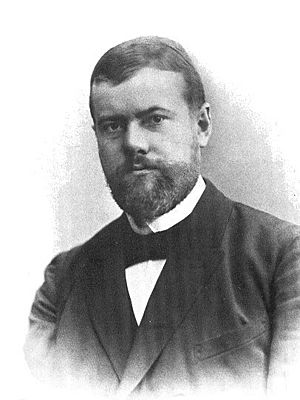
Ferdinand Tönnies talked about two types of human groups: Gemeinschaft (traditional communities with strong bonds) and Gesellschaft (modern societies with more individualism).
Max Weber was another important German sociologist. He believed that to understand society, we need to understand the meanings people give to their own actions. Unlike Durkheim, he thought there could be many reasons for social outcomes, not just one. Weber was very interested in how societies become more rational and less magical, which he linked to the rise of capitalism. He famously wrote The Protestant Ethic and the Spirit of Capitalism, suggesting that certain Protestant beliefs helped capitalism grow in the Western world.
Weber's wife, Marianne Weber, was also a sociologist. She wrote about women's issues and how women's work helps shape society.
Georg Simmel was another early German sociologist. He looked at how individuals fit into society and how culture shapes us. He studied topics like cities, money, and how strangers interact.
Herbert Spencer
Herbert Spencer was a very popular English philosopher and sociologist in the 1800s. He believed that societies, like living things, evolve over time. He even used the phrase "survival of the fittest" before Charles Darwin published his famous book. Spencer thought that more effective social forms would naturally progress.
However, Spencer's ideas later became less popular because of his views on race, which are now seen as a form of scientific racism. He believed that "inferior races" would naturally be removed, which is a harmful and outdated idea.
North American Sociology
Lester Frank Ward
Lester Frank Ward is considered a founder of American sociology. He was the first president of the American Sociological Association in 1905. He wrote several books, including Dynamic Sociology (1883), and became a professor of sociology at Brown University.
W. E. B. Du Bois
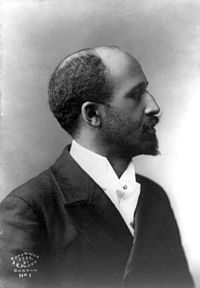
W. E. B. Du Bois was a very important American sociologist, especially for his work on race. In 1899, he published The Philadelphia Negro, a detailed study of African Americans in Philadelphia. This was a groundbreaking scientific study of Black people in the U.S. He also wrote The Souls of Black Folk (1903), where he famously said, "the problem of the Twentieth Century is the problem of the color line." He talked about the "double consciousness" that African Americans faced—being both American and Black.
Other Important Early Thinkers
Many other thinkers helped sociology develop. For example, Adam Ferguson argued that capitalism might weaken the social bonds that held communities together. Harriet Martineau also wrote about the United States, pointing out that the ideal of equality in the Declaration of Independence didn't match the reality for women and enslaved people.
These early sociological texts were different from pure philosophy because they tried to be more scientific and systematic in understanding society, especially the new relationships that came with the rise of capitalism.
19th Century: Sociology Becomes an Academic Subject
Growing as a School Subject
Europe
Sociology officially became an academic subject when Émile Durkheim started the first French sociology department at the University of Bordeaux in 1895. He also launched a sociology journal called L'Année Sociologique.
North America
In the United States, the first sociology course was taught in 1875. The first full sociology department was created in 1892 at the University of Chicago. This university became a major center for sociology, encouraging students to study society directly, not just in classrooms. Important sociologists like George Herbert Mead and W. E. B. Du Bois were connected to the University of Chicago.
In 1905, the American Sociological Association, the largest group of professional sociologists in the world, was founded.
International Cooperation
Sociologists started working together internationally in 1893, leading to the creation of the much larger International Sociological Association in 1949.
Key Sociologists: Durkheim, Marx, and Weber
Émile Durkheim, Karl Marx, and Max Weber are usually seen as the three main founders of modern social science. Their ideas are still very important in sociology today.
19th Century: From Positivism to Anti-Positivism
Early sociologists like Auguste Comte wanted sociology to be like a natural science, using experiments and observations to find facts. This idea is called positivism. Comte believed that true knowledge could only come from scientific methods that were carefully tested. Émile Durkheim also supported this, trying to find social laws and show how society influences individuals in many ways, even in things like crime or personality.
However, some thinkers disagreed. Karl Marx believed that we shouldn't just document facts, but also look critically at how things appear, because appearances can hide deeper problems. Other philosophers argued that the social world is different from the natural world because it involves human meanings, symbols, and cultures.
By the early 1900s, German sociologists like Max Weber and Georg Simmel introduced antipositivism. They suggested that research should focus on understanding human cultures, values, and social processes from a subjective point of view—meaning, trying to understand things from the perspective of the people involved. Weber believed sociology could identify causes, but not in the same way natural scientists do. He and Simmel pioneered the Verstehen (or 'interpretative') approach, where researchers try to understand a group by relating to them on their own terms.
20th Century: New Ideas and Global Connections
Early 20th Century
In the early 1900s, sociology in the U.S. grew, looking at both large-scale societal changes (macrosociology) and everyday human interactions (microsociology). Ideas like symbolic interactionism developed, focusing on how people create meaning through their interactions.
The Frankfurt School in Germany developed critical theory, which combined Marx's ideas with those of Weber and Freud. They often saw modern capitalism as moving away from the good ideas of the Enlightenment.
In the 1930s, Talcott Parsons tried to bring different sociological ideas together to create a universal way of studying society. He developed action theory and functionalism, which looked at how different parts of society work together like organs in a body.
Mid-20th Century
In some countries, like the Soviet Union and China, sociology was suppressed by governments. However, in the West, sociology continued to grow.
Robert K. Merton published his important book Social Theory and Social Structure in 1949. Around the same time, C. Wright Mills wrote The Sociological Imagination (1959). He argued that people often see their problems as individual issues, but they are actually connected to larger social processes. He also believed that the United States was ruled by a "power elite" of military, political, and economic leaders.
Also in 1959, Erving Goffman introduced dramaturgical analysis, which suggests that people act out different roles in everyday life to create specific impressions on others.
In the 1960s, Michel Foucault argued that power isn't just political or economic; it's everywhere in society, shaping how we think and behave. Sociologists also developed new ways to do research, both with numbers (quantitative) and with observations and interviews (qualitative). Paul Lazarsfeld made big improvements in statistical analysis for social research.
In the 1970s, Peter Townsend redefined poverty to include not just a lack of basic needs, but also being unable to have the typical lifestyle of others in society. Pierre Bourdieu introduced the idea of habitus, arguing that social class isn't just about money, but also about shared tastes and ways of living. He also talked about different types of "capital" beyond just money, like cultural knowledge or social connections.
Structuralism
Structuralism is the idea that human life can only be understood by looking at how different parts are connected to form a structure. It suggests that behind surface differences, there are constant rules of abstract structure. This idea started in linguistics (the study of language) in the early 1900s and later influenced other fields like anthropology.
Modernization Theory
Modernization theory tries to explain how societies change from "traditional" to "modern." It suggests that with help, traditional countries can develop in the same way more developed countries have. This theory was popular in the 1950s and 1960s.
Dependency Theory
Dependency theory came from Latin America and argued that poor countries are poor because of how they are connected to the "world system," where rich countries benefit from their resources. This theory was a criticism of modernization theory. It led to World-systems theory, which looks at the world as one big system, not just separate countries.
Systems Theory
Niklas Luhmann described modern society as being divided into different systems—like economic, educational, or political systems—all connected by communication. He saw society as a "system of systems" that reproduces itself through communication.
Post-structuralism and Postmodernism
In the 1960s and 1970s, post-structuralist and postmodernist theories became important. These ideas questioned traditional ways of thinking about human subjects and society. Thinkers like Michel Foucault explored how power is everywhere and shapes our knowledge.
Late 20th Century Sociology
Intersectionality
In the 1980s, Kimberlé Crenshaw developed the idea of intersectionality. This concept explains how different parts of a person's identity (like race, gender, or class) can combine to create unique forms of discrimination. For example, a Black woman might face different challenges than a white woman or a Black man.
Globalization
In the 1980s, sociologists also focused on globalization, which is the increasing connection and interdependence of countries around the world. Thinkers like Jürgen Habermas and Ulrich Beck explored how modern societies deal with new challenges and risks. Anthony Giddens worked on understanding the challenges of "high modernity" and developed new political ideas.
Zygmunt Bauman wrote a lot about modernity and postmodernity, especially in relation to events like the Holocaust and how people behave as consumers.
The 20th century also saw big improvements in how sociologists collect and analyze data. Longitudinal studies, which follow the same groups of people over many years, helped researchers understand long-term changes and causes.
21st Century Sociology
Today, sociologists use advanced computer software to analyze huge amounts of data from surveys. Social network analysis is a new way of studying how people are connected in groups, businesses, and even online. This helps us understand how information spreads and how influence works.
Critical realism is a way of thinking about science that tries to identify the hidden causes of social problems. It suggests that scientific study can lead to ways of criticizing and improving society, similar to the ideas of Karl Marx.
See also
 In Spanish: Historia de la sociología para niños
In Spanish: Historia de la sociología para niños
- Bibliography of sociology
- List of sociologists
- Outline of sociology
- Subfields of sociology
- Timeline of sociology
- Philosophy of social science
 | Leon Lynch |
 | Milton P. Webster |
 | Ferdinand Smith |


